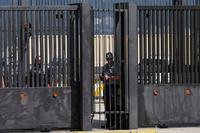Joint Chiefs Chairman Marine Gen. Joseph Dunford said Saturday the service chiefs are preparing a new plan to speed up the defeat of the Islamic State, in line with the campaign pledges of President-elect Donald Trump.
"The President-elect said he wanted to do that," Dunford said, and the service chiefs were readying a classified brief on a revised campaign against the Islamic State of Iraq and Syria, or ISIS, that would be presented to Trump once he's inaugurated.
Working with local forces, the U.S. has already "made significant progress" in defeating ISIS, Dunford said, but "there are some things that we probably would bring into the new administration for consideration." The general added, "I owe it to the new administration" to keep the advice under wraps until Trump signs off.
In an address to the all-day Reagan National Security Forum in Simi, Calif., Dunford also attested to the professionalism and readiness of the military in remarks that were at odds with Trump's frequent complaints about the parlous state of the armed forces and the need to reform and rebuild.
Without mentioning Trump's assertions, Dunford said there was too much emphasis on "worn out equipment and deferred modernization" in an era of unstable budgets. The U.S. military was the world's finest, Dunford said, and has a "competitive advantage over any potential adversary. I have absolute confidence that the joint force today can defend the homeland and our way of life."
U.S. military supremacy "needs to be understood by our allies," Dunford said, and the American public should understand that it's funding "the most capable military force in the world" because of "the quality of the young men and women we're fortunate enough to recruit and retain."
At a separate panel discussion earlier, Air Force Chief of Staff Gen. David Goldfein said the brief being prepared for Trump would focus on potential military responses to threats posed by Russia, Iran, North Korea, China and terrorism. The Joint Chiefs report would be apart from the daily intelligence briefings being made available to Trump, which he frequently skips.
Goldfein said he recently returned from two weeks in South Korea, where concerns over the nuclear threat from North Korea "are ... real and growing." The South Koreans and the Japanese repeatedly stressed to him "the need for extended deterrence" from the U.S. nuclear umbrella and "their reliance on the deterrence we provide."
In addition, "we are quite concerned with the continued malign activity Iran has engaged in across the region," Goldfein said. "We're prepared to lay this all out for the president-elect."
Goldfein dismissed concerns about the "unpredictability" of Trump and whether that would limit him as commander-in-chief.
"I can't speak to the policy," Goldfein said, adding his job was to provide options in response to a threat "so the president can act as he sees fit. I want to provide the widest spread of options. If there's unpredictability in that because the president has more options, then I've done my job."
At a separate panel, outgoing Air Force Secretary Deborah Lee James said Goldfein's ability to provide options, and the military's ability to respond to emerging threats while rebuilding the nuclear triad, would all depend on Congress providing more funding and ending the cost-cutting sequestration process. "The money will need to flow," she said.
-- Richard Sisk can be reached at Richard.Sisk@Military.com.
Related Video:
ISIS Propaganda Machine





























